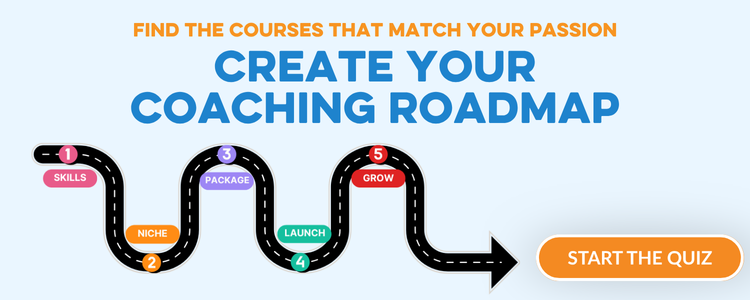 https://transformationacademy.com/wp-content/uploads/2025/09/pexels-cottonbro-5364989-scaled.jpg
1707
2560
Joeel & Natalie Rivera
https://transformationacademy.com/wp-content/uploads/2021/03/Transformation-Academy-L-300x252.png
Joeel & Natalie Rivera2025-09-16 19:16:372025-09-10 17:45:23Life Coaching Retreats: Plan Immersive Weekends
https://transformationacademy.com/wp-content/uploads/2025/09/pexels-cottonbro-5364989-scaled.jpg
1707
2560
Joeel & Natalie Rivera
https://transformationacademy.com/wp-content/uploads/2021/03/Transformation-Academy-L-300x252.png
Joeel & Natalie Rivera2025-09-16 19:16:372025-09-10 17:45:23Life Coaching Retreats: Plan Immersive WeekendsConfidence Coach: How to Become a Guide for Self-Belief and Growth
“I’m not good enough.”
These four words show up in countless coaching sessions, quietly holding people back from the life they want. Whether it’s launching a business, pursuing a dream job, or speaking up in relationships, the real obstacle often isn’t skill or strategy—it’s confidence.
This is where you come in.
As a confidence coach, you can help others silence their inner critic, build self-trust, and step into their full potential. If you’re passionate about personal growth and love seeing people break through limiting beliefs, confidence coaching could be your ideal niche.
In this guide, you’ll learn what a confidence coach does, how to become one, and how to start building a meaningful, profitable coaching practice from the ground up.
What Is a Confidence Coach?
A confidence coach helps clients strengthen their self-belief, build resilience, and develop the mindset needed to pursue their goals. This can range from overcoming imposter syndrome to preparing for high-stakes events like interviews, performances, or business launches.
Confidence coaching often includes:
-
Identifying and challenging negative self-talk
-
Setting realistic, stretch-based goals
-
Practicing new behaviors through role-play or real-life tasks
-
Cultivating a growth mindset and emotional resilience
-
Creating systems for accountability and follow-through
It’s not therapy, and it’s not consulting. Confidence coaches don’t diagnose or direct. Instead, they guide, support, and empower clients to rewrite their inner narrative and take bold action.
Why Confidence Coaching Is So In Demand
According to a recent study, up to 85% of people struggle with low self-esteem at some point in their lives. And in an era filled with curated social feeds and pressure to perform, it’s no surprise that self-doubt is on the rise.
More people are turning to coaches—not to fix them, but to help them unlock what’s already inside.
Common client goals for confidence coaching:
-
Speak more assertively at work
-
Start a new business or creative project
-
Heal from past failures or criticism
-
Feel more comfortable in social situations
-
Stop comparing themselves to others
Confidence isn’t just a “nice to have.” It’s the foundation for everything from leadership to relationships to life satisfaction. That’s why confidence coaches are playing such an essential role in the personal development space.
How to Become a Confidence Coach
1. Clarify Your “Why”
Confidence coaching is more than a profession—it’s a calling. Before you begin, ask yourself:
-
Why does helping others build confidence matter to me?
-
Have I overcome my own self-doubt? What did that teach me?
-
What kinds of clients am I most passionate about serving?
Your personal journey becomes part of your coaching brand. When you’re authentic, clients can sense it—and trust you more deeply.
Want to narrow your niche even more? Learn how in How to Find Your Life Coaching Niche
2. Get Certified
There’s no legal requirement to become a coach—but training matters. A strong certification teaches you:
-
Proven frameworks for building self-confidence
-
How to structure coaching sessions for real results
-
Ethical practices and professional boundaries
-
Tools for creating a client-attracting brand and business
Our Confidence Life Coach Certification (get 60% off) walks you through all of this and more. It even includes a full Growth Mindset course, helping you shift both your clients’ mindset and your own.
3. Learn the Core Skills of a Confidence Coach
A successful confidence coach needs to develop specific coaching competencies. These include:
Active Listening
Create a space where clients feel safe to explore their insecurities without judgment.
Powerful Questioning
Ask open-ended questions that help clients discover their own insights.
Goal Setting & Accountability
Help clients identify specific goals and create realistic action plans with check-ins.
Reframing
Guide clients in seeing setbacks as learning opportunities instead of evidence of failure.
4. Build a Confidence-Focused Coaching Program
To attract clients, package your services into a results-based coaching program.
Here’s an example structure:
Program: “Unshakable: 6 Weeks to Self-Belief”
-
Week 1: Clarify your confidence blockers
-
Week 2: Break through limiting beliefs
-
Week 3: Set aligned, stretch goals
-
Week 4: Practice assertive communication
-
Week 5: Take bold, aligned action
-
Week 6: Reflect and renew
Having a structured program helps clients understand the journey and see the value before they invest.
5. Market Your Confidence Coaching Business
Once your foundation is set, it’s time to find your first clients. Here are a few strategies to start with:
-
Offer a free discovery session that ends with a clear, confident invitation to work together
-
Create social content that shares your story and tips on building confidence
-
Speak on podcasts or at local workshops to get in front of ideal clients
-
Partner with professionals who serve similar audiences—like therapists, career coaches, or fitness pros
For more ideas, read 7 Proven Tips to Land Your First Life Coaching Client
Is Confidence Coaching Right for You?
You might make a great confidence coach if:
-
You’ve overcome low self-esteem or want to help others do the same
-
You light up when people share their dreams with you
-
You’re patient, present, and genuinely want to see others thrive
-
You value growth—both for yourself and your clients
Confidence Coaching: A Powerful Way to Make an Impact
Confidence is one of the most requested coaching outcomes—and one of the most transformational. As a confidence coach, you’ll help others shift how they see themselves, take action with courage, and create lives that reflect their true potential.
Action Step
Think about one person in your life who could benefit from greater self-confidence. Now imagine being the coach who helps them get there.
You can be that guide.
Ready to Take the Next Step?
Help others build self-belief—get certified with our Confidence Life Coach Certification and start coaching with impact.
With 60% off, now is the perfect time to begin your journey toward becoming a transformational coach in one of the most meaningful niches out there.









